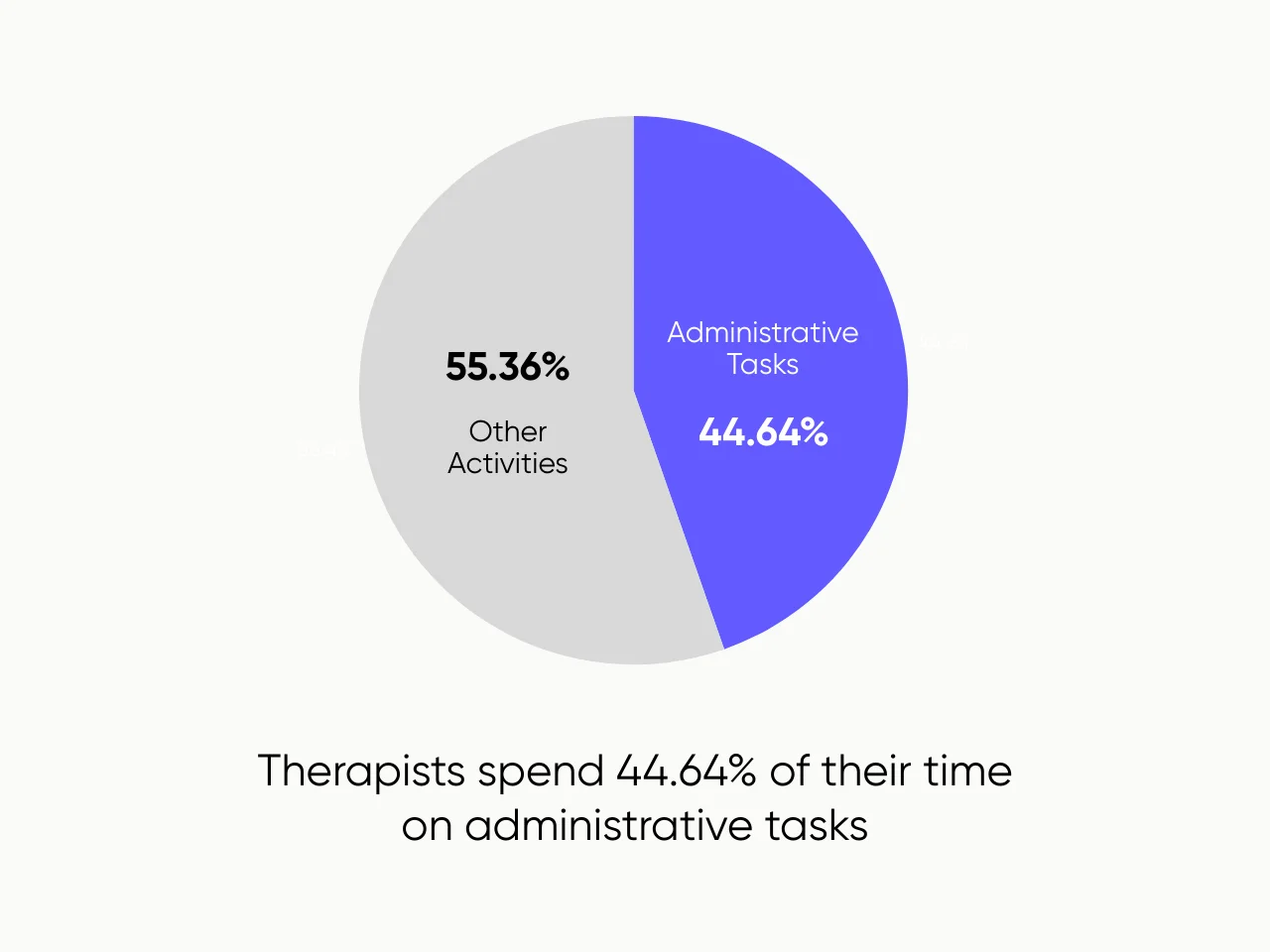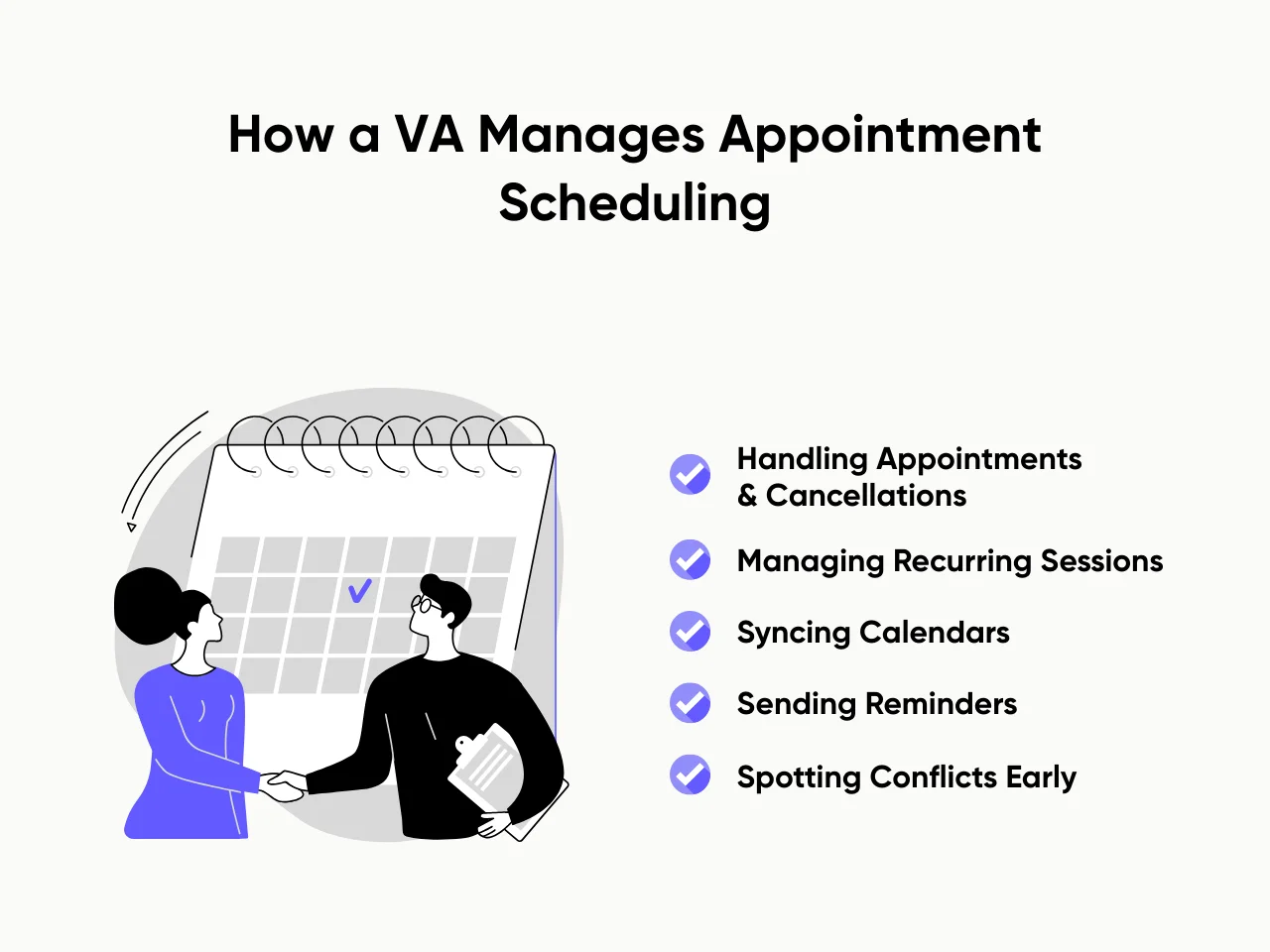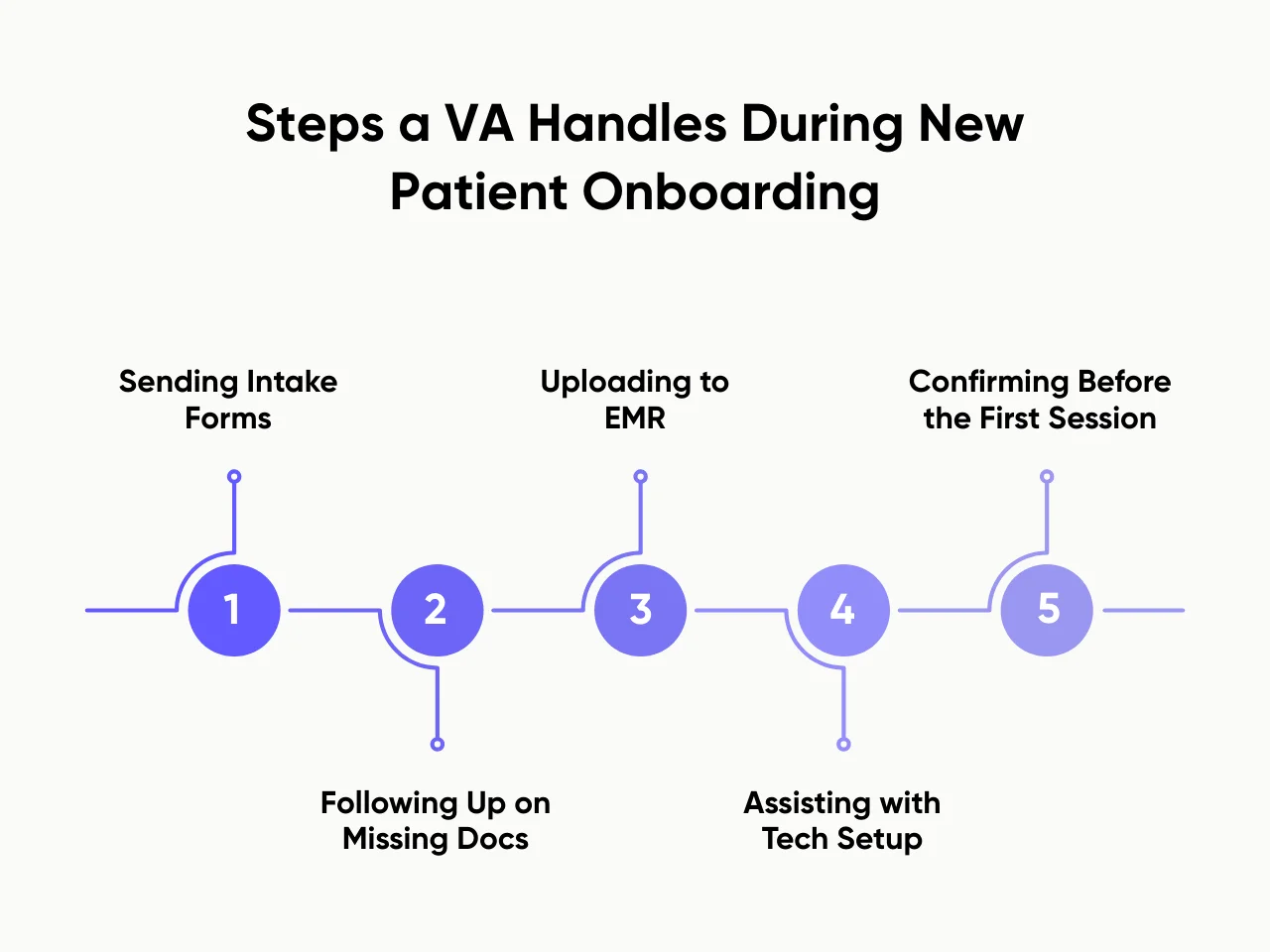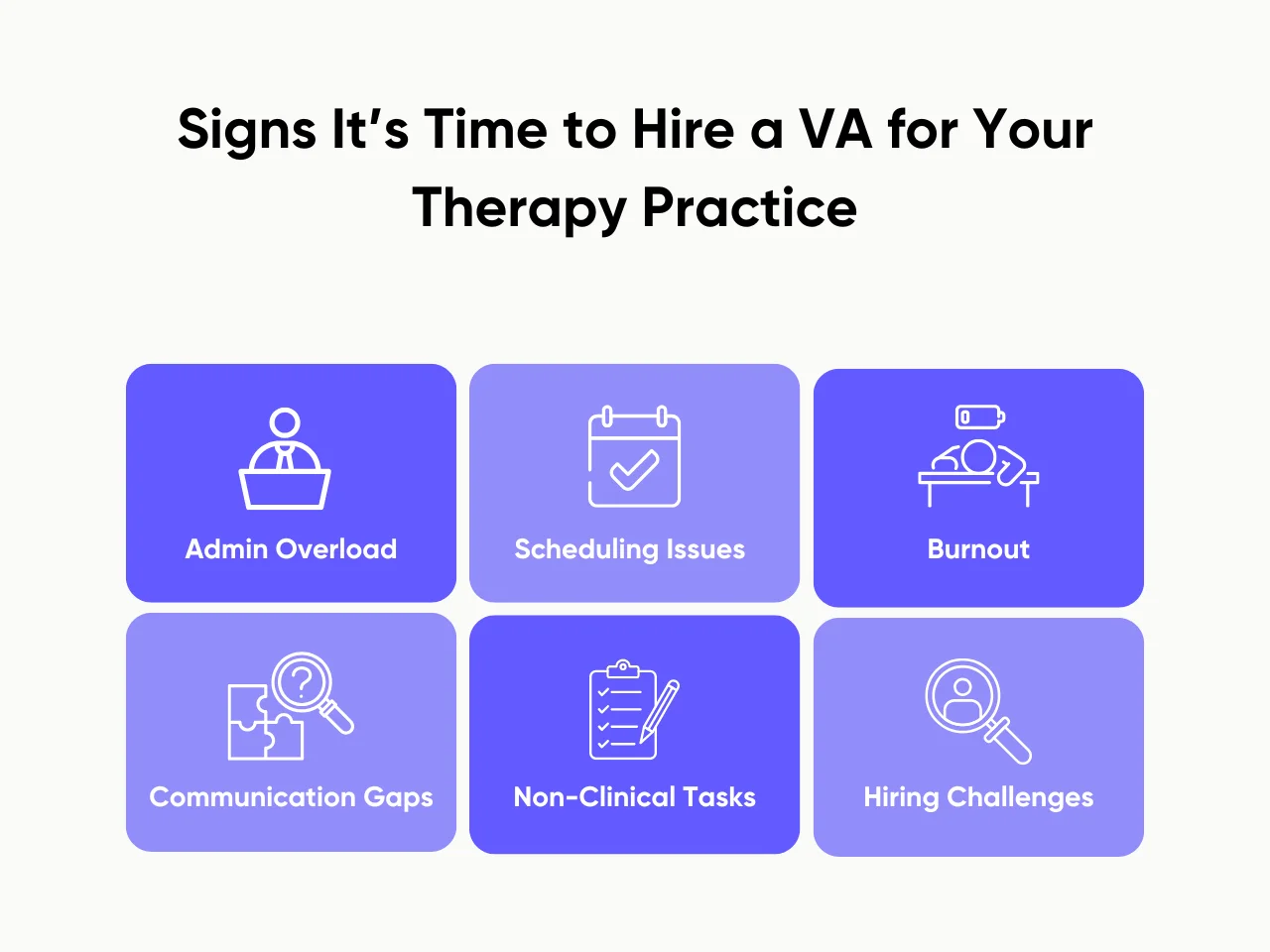Catena is now Pearl Talent! Same mission, new name.
Your clinic is meant to serve your patients rather than to manage calendars and insurance follow-ups. But between missed calls, intake forms, billing backlogs, and a schedule that won’t sit still, your clinical day now comes with more admin than you’ve ever imagined. That’s where a virtual assistant for therapists stops being a luxury and starts becoming a necessity.
At Pearl Talent, we support mental health professionals like you, whether you're running a solo practice or scaling a growing team. We match therapists with full-time virtual assistants who are already trained for mental health workflows. They take on the admin that eats up your time, so you can stay focused on your clients, not your inbox.
In this guide, we’ll walk through exactly what tasks a VA can take off your plate and how to tell when it’s the right time to bring one on.
Why Therapists Are Turning to Virtual Assistants
For therapy offices that face a high volume of admin work, a virtual assistant for therapists can step in to manage scheduling, communication, billing, and intake so you and your team can focus on client care instead of admin overload.

One study highlighted that physicians spend approximately 44.64% of their time on administrative tasks. Most therapy teams don’t realize the significant burden of non-clinical duties until it starts affecting the quality of care. The pressure builds slowly, missed follow-ups here and billing delays there, until errors start to pile up.
Virtual administrative support is a practical solution to recover or maintain the long-term health of your practice. Here's why more therapists are making the shift:
Reducing Admin Overload
Admin work finds its way of creeping into everything. One late form turns into a delayed claim. One missed message becomes a frustrated client. Over time, this doesn’t just slow down your practice but also drains your team’s bandwidth.
Here are the early symptoms:
- Reminders not going out on time
- Claims getting denied for missing documentation
- Evenings spent catching up on emails and charting
A reliable assistant helps restore rhythm to the day so your team can actually focus on clients.
Refocusing Therapist Time

Small admin tasks can interrupt the flow of clinical work more than most realize. Calendar updates, follow-ups, and inbox pings all compete for your team’s attention.
With the right support in place:
- Reschedules are handled before they become conflicts
- Client communication is timely and professional
- Notes and files are kept current without chasing
The right mental health virtual assistant understands how to preserve your focus during back-to-back therapy sessions.
Supporting Hybrid Care
Many practices now default to hybrid care. You're juggling in-person sessions, telehealth appointments, file systems, and synced calendars across platforms. That flexibility expands your reach, but it also adds layers of coordination behind the scenes.
This is exactly where a remote assistant shines. Because they’re already working digitally, they can plug into your virtual workflows without slowing things down. They can help with:
- Managing telehealth links, consent forms, and digital intake
- Coordinating calendars across in-person and virtual availability
- Following up with clients between sessions for reminders or rescheduling
Incorporating a virtual assistant into your team means support that’s already designed for hybrid systems. No learning curve and no extra friction. Just smart, steady help where your practice needs it most.
Working Inside Therapy Systems
Therapy practices rely on systems like SimplePractice, TheraNest, or TherapyNotes. But those systems only work when they’re used right and kept updated.
At Pearl Talent, we place assistants who already know the tools. They’re:
- Familiar with mental health EMRs and admin workflows
- Comfortable with secure communication protocols
- Trained to step into real practices, not just take tasks
It’s not about offloading work. It’s about getting the right help the first time.
What Tasks Can Virtual Assistants for Therapists Handle?
Once therapy practices bring on virtual support, the next question is usually: What exactly can they take off my plate?
–More than you think, especially when they’re trained in mental health operations. These professionals aren’t just handling one-off tasks. They can step into core admin workflows for daily operations.
Let’s break down the areas where the right assistant can make the most immediate impact:
Appointment Scheduling and Calendar Management
When your schedule isn’t running smoothly, late cancellations, missed reminders, or calendar gaps can throw off more than just your time. They disrupt the client experience, too.
A trained virtual assistant can take over scheduling coordination and bring order to the chaos remotely. They can take care of the details that directly impact patient satisfaction and overall patient experience. That usually includes:
- Managing new appointment requests, cancellations, and reschedules
- Overseeing recurring sessions and provider availability
- Syncing calendars with platforms like SimplePractice or TheraNest
- Sending reminders and confirmations to help reduce no-shows
- Identifying scheduling conflicts or gaps before they become issues

With the right support in place, your calendar runs smoothly as it would with a front-desk team. Sometimes even better, since most therapy scheduling already happens online. A VA can either work alongside your staff or fully manage scheduling remotely, without missing a beat.
Insurance Verification and Billing Support
This is where things start to get messy for many small therapy practices. You’re confirming benefits over the phone, documenting coverage, double-checking codes, and doing it all before a single session starts. Just a small error means denied claims, delayed payments, and confused clients.
A therapy virtual assistant understands the systems, the CPT codes, and the steps involved. They can:
- Check insurance benefits before a client is booked
- Track and organize eligibility documents and intake forms
- Submit accurate claims and flag errors before they cost you
- Follow up on unpaid invoices and appeal denials
- Keep clients informed about their coverage and copays
Clean billing workflows support practice growth and reduce errors that frustrate both mental health providers and clients.
At Pearl Talent, we place assistants who already understand how mental health billing works. They're trained to spot issues before they become problems and to communicate clearly with both payers and patients.
Client Intake and Onboarding
First impressions matter, and intake is where most therapy practices lose valuable time and sometimes even new clients. When this process is inconsistent, clients feel confused, staff gets overwhelmed, and important documents go missing.
A therapist VA can keep everything moving from the moment a new client reaches out. They support intake by:
- Sending and tracking digital intake forms
- Following up on missing documents or consents
- Uploading completed paperwork to your EMR or client portal
- Walking clients through basic tech setup (logins, telehealth links, portal access)
- Checking that everything is in place before the first session

When onboarding is handled well, new clients come in prepared, sessions start on time, and providers aren’t stuck chasing paperwork at the last minute.
This kind of structure doesn’t just save time. It improves the client experience right from the beginning.
Email and Communication Management
For many therapists, the inbox is a constant source of distraction. It’s not just the volume of messages. It’s the interruptions, the follow-ups, and the mental load of trying to keep up while staying focused on client care.
A remote assistant can step in to handle day-to-day communication tasks. This makes sure nothing important is missed and frees your team from the back-and-forth. That support typically looks like:
- Monitoring and organizing incoming emails and voicemails
- Responding to routine questions or routing them to the right person
- Sending reminders for upcoming sessions, forms, or payments
- Flagging urgent messages for quick attention
- Updating templates and auto-replies to reflect your brand and tone
When communication is consistent, clients feel supported, and your team stays focused on what they do best. It’s a simple change that prevents unnecessary stress and keeps your practice running smoothly.
Social Media and Online Presence Support
For many private practice owners, your online presence is often your first point of contact with potential clients. But staying active on social platforms or maintaining your content calendar is tough when you're deep in client care.
A virtual assistant for therapists can support your social media management and online visibility without needing constant oversight. Here’s how that usually plays out:
- Scheduling posts across platforms like Instagram, Facebook, and LinkedIn

- Drafting captions and organizing basic visuals to match your voice
- Sharing blogs, practice updates, or client resources
- Monitoring messages, comments, and reviews for timely response
- Keeping testimonials, FAQs, or service details up to date
With consistent content and engagement, your practice stays visible and approachable, without becoming a time drain for your clinical team.
File Organization and EMR Maintenance
When digital files are disorganized, the impact adds up quickly. Your team will waste time, miss details, and experience unnecessary stress. Whether it’s session notes, consent forms, or intake packets, finding what you need shouldn’t feel like a search mission.
A well-trained assistant helps keep your digital systems clean, current, and easy to navigate. Their key responsibilities include:
- Uploading and organizing client documents and progress notes
- Removing duplicates and archiving outdated files
- Tagging and categorizing records for easy access
- Maintaining folder structure across your EMR or cloud platforms
- Following up on missing or incomplete paperwork
Clean systems create smoother workflows. Sessions start on time, and documentation is accurate. Your team also spends less time digging and more time doing the work that matters.
Admin Support for Group Practices
As your practice grows, so does the complexity behind the scenes. Coordinating multiple providers, locations, and caseloads takes more than just good intentions; it takes systems. Without dedicated support, it’s easy for things to get missed.
That’s where a remote assistant becomes a key part of your team, handling tasks while helping your practice run more smoothly as it scales. They typically assist with:
- Coordinating calendars across providers and departments
- Managing shared inboxes, task lists, or team communication channels
- Assisting with credentialing paperwork and license tracking
- Updating directories, forms, and shared resources
- Flagging scheduling gaps or overlapping availability
This kind of support gives your in-house team breathing room and helps prevent admin bottlenecks as you grow. It’s about consistency, visibility, and making sure nothing falls through.
At Pearl Talent, we often place remote professionals in high-growth or multi-site therapy practices, a kind of support that scales alongside your care.
Signs It’s Time to Hire a Virtual Assistant for Your Therapy Practice

Therapists don’t usually bring in support because things are going smoothly. It’s the missed messages, the growing backlog, the quiet realization that you’re spending more time coordinating care than delivering it. These signs show up before things break, and they’re easier to fix when caught early.
If any of the following feel familiar, you may be beyond the point of just “working harder:”
- You’re stuck doing admin instead of therapy: You're starting your day in the inbox, not the therapy room. Tasks like billing, scheduling, or chasing intake forms now take priority over session prep. Over time, this shift cuts into clinical hours and your energy.
- Scheduling and no-shows are hurting your practice: You’re constantly juggling cancellations or manually sending reminders. Missed sessions, late reschedules, and calendar mix-ups are now the norm, and they’re costing you time, revenue, and consistency.
- Burnout is affecting your quality of care: Documentation drags into the evening, client notes feel harder to finish, and you’re booked solid but always behind. These are more than just busy weeks; they’re early symptoms of burnout. A survey found many therapists regularly work beyond compensated hours, fueling fatigue and dissatisfaction.
- Client communication is falling through the cracks: Follow-up messages are delayed, voicemails get lost, and new client inquiries aren’t answered fast enough. The longer it takes to respond, the more likely it is that a client disengages or goes elsewhere.
- You’re handling work that doesn’t need a license: You’re resending intake forms, double-checking insurance, or managing calendars, tasks that don’t require clinical training but take up licensed time. That kind of inefficiency isn’t sustainable.
- Hiring admin staff isn’t financially sustainable: You need help, but not another full-time salary, benefits package, or long onboarding cycle. A virtual assistant service gives you high-impact support at a fraction of the cost of in-house admin hires..
If these signs sound familiar, you’re not the only one. At Pearl Talent, we help therapy practices bring on remote assistants who are already trained in mental health systems and workflows. With us, you finally get the support your team needs to keep growing without burning out.
Key Takeaway
Admin shouldn’t be what holds your practice back. When emails pile up, claims are delayed, and burnout starts creeping in, it’s a sign your team needs support.
At Pearl Talent, we help practices hire assistants trained in mental health systems. They’re professionals with the discretion, experience, and focus to handle scheduling, intake, billing, and documentation without missing a beat.
If you're ready to ease the operational load and reclaim time for clinical work, a virtual assistant for therapists could be exactly what your practice needs. Contact us to match with the right support.
Frequently Asked Questions
Originally Published
May 29, 2025




.svg)



.webp)














